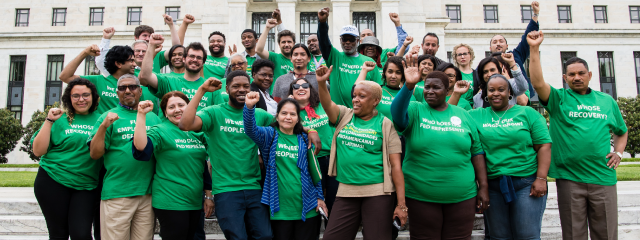Blog
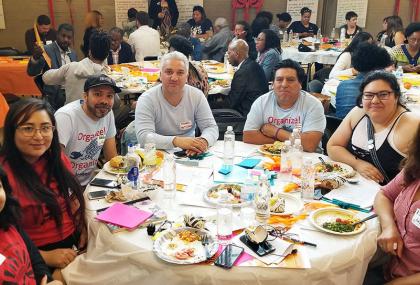
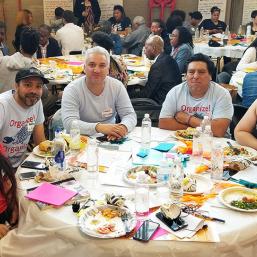
Written by Dianne Enriquez, Director of Opportunity Campaigns at CPD
During the leadership conference last week, I had the privilege of participating in a gathering of 20 Latinx executive directors and staff leaders from 13 CPD Network affiliates for the first time. Together, we learned more about each other’s personal stories and spent time thinking about the tremendous potential and opportunities available to us as a community within the CPD Network.
For leaders of color in this work and at the helm of organizations, there is a special kind of pressure that comes from the simultaneous need to break barriers stemming from institutional racism, all while doing our best to create a path for authentic leadership that is representative of our own communities. It is an opportunity to create more space for emerging leaders of color, and a responsibility that can be both invigorating and overwhelming.
As these strong and brilliant leaders walked into the room, it became clear that this was a space that many of us had been craving. This was more than a meeting; this was a family reunion.
We outlined parameters for our future work together and clarified commitments to put forward a bold and aspirational shared vision for social justice in the Latinx community to create stronger alignment in our work across the country. If you are a Latinx executive director or staff leader from a partner organization that wasn’t able to make it to the Leadership Council and would like to be involved, please contact Dianne Enriquez.
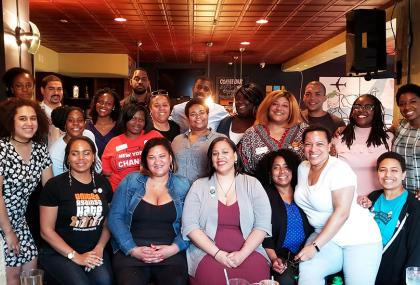
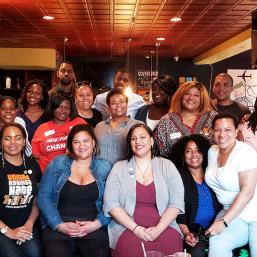
In the previous gatherings, the Black Leadership space had been focused on building the capacity of the Black executive directors in the CPD Network. This time, the space was opened up to Black leaders within all positions of our affiliated organizations. Leaders like Brianna Brown, the Deputy Director of Texas Organizing Project (TOP), was able to share some of the work that TOP is leading in Texas to bail out incarcerated mothers ahead of Mother's Day. [Read more on our blog. - linked to blog]
Throughout the country, we have seen increased attention to police violence, income inequity and attacks on civic participation. CPD affiliates have led the way in their respective geographies on conversations and community-based solutions. From One Pennsylvania, who is taking on the school-to-prison pipeline, to Black Leaders Organizing Communities (BLOC) in Wisconsin, who have reframed the narrative around safety to include community investments and not policing, the CPD Network’s Black leadership is on the frontlines fighting to protect our communities and our values.
CPD affiliates in attendance included Arkansas Community Organization (AR), Black Leaders Organizing Communities (WI), Churches United for Fair Housing (NY), Good Jobs Now (MI), New York Communities for Change (NY), One Pennsylvania (PA), Organize Florida (FL), SPACES (Washington, DC), Step Up Louisiana (LA), Texas Organizing Project (TOP), United for a New Economy (CO), West Virginia Healthy Kids (WV).
As this space continues to grow, opportunities to collaborate will also increase. If you are a Black executive director or staff leader from a partner organization that was not able to make it to the Leadership Council and would like to be involved, please contact Tracey Corder.
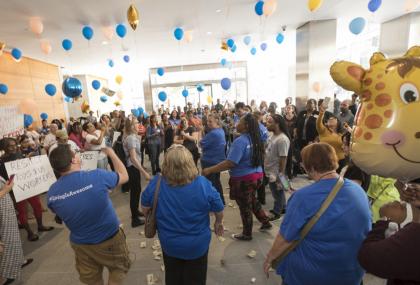
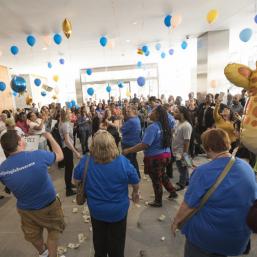
Toys R Us workers, their allies in Congress and more than 100 community leaders gathered on Capitol Hill on May 9 to demand accountability of Wall Street for its role in causing the economic instability of working families and communities across the country.
Uniting with CPD affiliate Organization United for Respect (OUR), the workers kicked off a powerful campaign, Rise Up Retail, to demand that the private equity owners of Toys R Us pay severance for all Toys R Us workers and to call on members of Congress to outlaw exploitative Wall Street speculative deals. A video of the workers’ meeting with Sen. Bernie Sanders has already garnered over 2 million views. The action was covered in the New York Times, Crain’s Detroit, CBS, Bloomberg, UPI, and Racked.
Private equity companies KKR & Co., Bain Capital, and Vornado Realty Trust bought the iconic toy seller in 2005 in a leveraged buyout that saddled – and ultimately sank – the company with $5 billion debt. Thirty-three thousand Toys R Us workers and their families are in crisis as the company liquidates in the third largest retail bankruptcy in history. KKR, Bain and Vornado walked away with a reported $470 million in management fees from the deal.
The day of action brought Toys R Us workers from Michigan, Arizona, Texas, and North Carolina to Washington, DC to meet with Members of Congress, including Sen. Bernie Sanders, Rep. Keith Ellison, and Sen. Sherrod Brown, calling for policymakers to support a windfall profits tax on private equity and hedge funds, as well as strong legal and regulatory action to stop dangerous leveraged buyouts and end stock buybacks that push profits to wealthy investors instead of working people and communities.
Workers are also calling for severance from KKR, Bain Capital, and Vornado Realty Trust They were joined by more than 100 leaders from CPD’s affiliates, and led a lively protest at the American Investment Council, the organization representing private equity firms such as KKR and Bain Capital. The $470 million pocketed by KKR, Bain and Vornado would be enough to pay more than $14,000 in severance to each employee losing his or her job.
“This fight affects thousands of families just like mine,” said store manager Tracy Forbes. “This fight affects a huge population of mostly hard-working women and single moms who can’t feed their kids, afford rent, or pay their electricity bill.”
In May and June, workers, community groups, and Members of Congress will continue to raise the pressure on the companies, with actions planned at Toys R Us headquarters in New Jersey and at the offices of KKR and Bain Capital in New York City. Institutional investors of KKR and Bain, including Maine Public Employees Retirement System, Cal Public Employees Retirement System, PA Public School Employees Retirement System, and the University of California, are all looking into the issue.
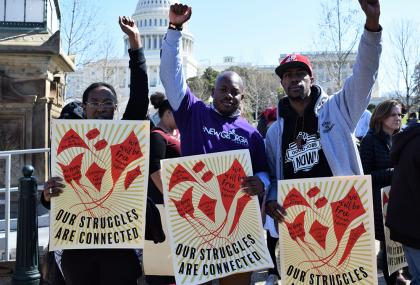
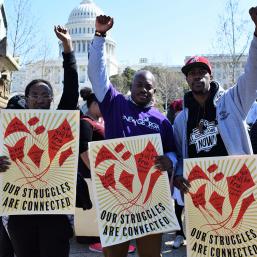
As part of CPD’s annual Leadership Council, over 100 grassroots leaders representing 30 CPD affiliates from all over the country headed to Capitol Hill on May 9 to meet with their Senators and Representatives. Collectively, we held more than 30 meetings with members of Congress from 26 states to elevate our core priorities -- including Medicare for All, adequate funding for the opioid crisis, more robust support from FEMA for hurricane victims, and a legislative solution to the crisis that Trump created when he ended Deferred Action for Childhood Arrivals (DACA) and Temporary Protected Status (TPS). CPD affiliates connected these national issues to the particular needs within their own cities and states, making real the need for federal action.
In 2017, CPD affiliates joined together to help block some of the most devastating aspects of this administration’s agenda. In 2018 and beyond, we are ready to go on the offense and demand the freedom to thrive for all communities. With our day of action and lobby visits on May 9, we kicked off our “Summer of Heroes.” Every week throughout the summer, CPD affiliates will be in Washington DC to participate in mobilizations, lobby visits, and other federal fightback and advocacy efforts.
During May and June, this will include supporting the Poor People’s Campaign, which is leading an effort to unite people across the country to challenge the evils of systemic racism, poverty, the war economy, and ecological devastation during a key election year. We urge you to support this integral program by making a donation today.
For the past two years, the Poor People’s Campaign has reached out to more than 30 states across the country gathering testimonials and thousands of poor people in order to chronicle their demands for a better society. As a result, the campaign released The Souls of Poor Folk which traces the 50 years since 1968, when Rev. Dr. Martin Luther King Jr., and thousands of Americans, launched the Poor People’s campaign. The study makes the case that the most pressing problems of our time cannot be tackled separately. It connects the attacks on voting rights to the attacks on basic needs like water, health care, living wages, and shift towards incarceration and criminalization of the poor, with disparate effects across race, gender, gender identity, and sexual orientation.
Moreover, The Souls of Poor Folks reminds us of the importance of the ongoing and emerging resistance and organizing that is compelling a change in our national priorities. With this in mind, highly publicized, non-violent direct actions will take place in the District of Columbia and in state capitals around the country; the first action took place on May 14. Some CPD affiliates are anchoring Poor People’s Campaign actions in their states, while others are mobilizing to participate in weekly actions in Washington, DC. Our sister organization, CPD Action, will be helping to coordinate in-state actions across the country this summer, and we will come together in Washington, DC to drive our network’s federal agenda. or more information about Summer of Heroes or to get involved, please contact Jennifer Flynn Walker.
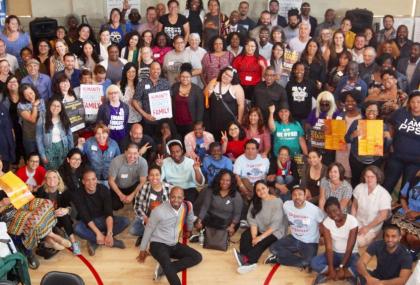
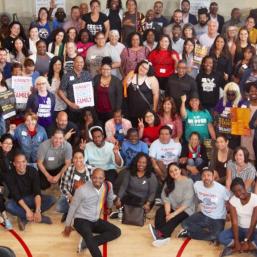
From May 8-10, CPD welcomed over 150 grassroots organizers, and organizational leaders from 36 of our affiliates from across the country to our Second Annual Leadership Council Convening in Washington, DC. The gathering was a critical opportunity for us to gather as a network, build relationships and shared purpose, and take our voices and our resistance to the Capitol.
As part of the event, affiliates held over 30 meetings with members of Congress on the priority issues including health care, disaster relief in Puerto Rico, immigration and the opioid crisis. The visits were followed by rallies and direct action at the federal Office of Management and Budget, where we demanded divestment from initiatives that over-police and criminalize our communities, and at the American Investment Council, where we called for accountability from private equity for the loss of 30,000 jobs through the exploitative acquisition and sale of Toys R Us. Read more about the sessions and actions from the Leadership Council below.
Throughout the three days, affiliates connected with each other, built relationships, and engaged in critical conversations about worker organizing, education justice, climate justice, redistricting and the census, and other shared priorities. We hosted workshops on community and self-care, building movement through voter engagement and bird dogging elected officials.
Additionally, delegations to the Leadership Council met in a five-hour session on May 10 in the Historic Thurgood Marshall Center for Services to affirm our shared values and vision, building a shared ideology, and coordinating to express our shared agenda federally in a powerful way.
These conversations established a shared understanding of what binds us together as a network and to set priorities for our collective work at the federal level. The gathering laid a foundation for increasingly impactful work in the immediate term and for years to come.
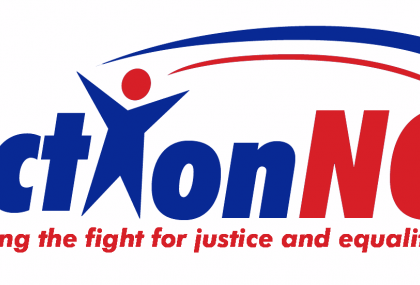
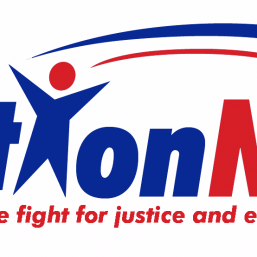
In the wake of the murder by police of Keith Lamont Scott and the Charlotte Uprising, CPD affiliate Action NC is driving several powerful police accountability campaigns in Charlotte, North Carolina. Keith Scott’s death brutally illuminated the weaknesses of the Charlotte-Mecklenburg Police Department’s (CMPD) existing accountability measures. While CMPD issued body cameras to some of their officers before the shooting, police routinely turned their cameras off or simply did not wear them. Footage of police shootings was only released after investigations in misconduct cases.
This loose patchwork system of police accountability failed the residents of Charlotte. Action NC organized to win comprehensive reforms to protect the civil rights and lives of their members, including mandatory body cameras for the CMPD’s SWAT and Tactical teams. The most heavily militarized teams of the CMPD must now face transparency and accountability for their actions. Off-duty officers who are working for private security must also wear body cameras, ensuring that private security cannot abuse their authority as police officers. Rather than leave the decision to turn off their cameras in the moments when they are most needed, Action NC won that officer’s cameras would automatically turn on when either their taser or gun is removed from their holster. Body cameras must now be active during all encounters between civilians and police—and police must get recorded, verbal permission for their searches to be legal. Without explicit permission, their searches are overwhelmingly inadmissible in court. Action NC won the release of police shooting videos to the public before internal investigations concluded, setting a state-wide precedent for badly-needed transparency. Strengthening Charlotte’s Citizen Review Board so that the Board can issue subpoenas is the critical next step toward an accountable, respectful CMPD.
Beyond the CMPD, Action NC has won commitments from the interim District Attorney to stop requiring cash bail for Class 3 misdemeanors and below. This eliminates the requirement of cash bail for most marijuana possession offenses—a major source of racial disparities in our criminal justice system. The interim DA has ceased requiring fines or fees to be paid down below one thousand dollars before persons facing conviction can instead be placed into deferred prosecution programs.
Action NC’s members have fought tirelessly against the New Jim Crow in the shadow of the old. Winning just, respectful policing across North Carolina is a critical keystone to building broad political power for Black and Latinx Southerners and communities of color across the nation. Please support our work across North Carolina to win just policing.
On the anniversary of Freddie Gray’s death and to commemorate the anniversary of the Columbine tragedy, more than 20 mostly Black and Brown-led youth organizations, representing thousands of youth of color from across the country, published a petition calling attention to their demands in the ongoing debate around school safety, gun control and violence against youth. You can support this platform by signing on to their petition.
The #YouthDemand statement and petition was endorsed by numerous national organizations, alliances and networks, including the Center for Popular Democracy (CPD), the Advancement Project, the Center for Constitutional Rights (CCR), Journey for Justice, the Alliance to Reclaim our Schools (AROS), the Alliance for Educational Justice (AEJ), Dream Defenders, National Education Association (NEA), the American Federation of Teachers (AFT), and many other allies.
The #YouthDemand statement highlights the already deeply entrenched ‘school-to-prison pipeline,’ and makes a compelling demand for reforms for school safety and gun control that do not involve increased policing, surveillance and doubling down on policies that criminalize of youth of color at their schools.
As the youth stated in their letter:
“While people take up the debate around school safety and gun control with new energy, the debate itself is nothing new. We know this because we are the Black and Brown young people who have been at the forefront of these debates,” say the youth in their letter. “When we go to school we are being prepared for prison more than we are being prepared for life. We see guns, and as Black and Brown children we know they are more likely to be used against us than to protect us. We are dehumanized by dogs sniffing our backpacks, harassed by police through invasive body searches and metal detectors, stripped of our privacy as officials rifle through our lockers, and surveilled by cameras as they capture our every move. This is our current reality – a school environment that treats us as suspects, as criminals.”
To change this reality, young people demanded:
-
Divestment from school policing.
-
Comprehensive mental and emotional health services.
-
More guidance counselors and social workers.
-
Expansion of restorative justice practices.
-
Culturally Responsive Education.
-
Investment in schools and teachers.
-
Protection for students and families from ICE arrests.
-
A concrete plan to end gun and state violence in all of its forms.
Several national organizations and youth-led campaigns adopted the demands into campaigns pressuring local governments and school districts to end over-policing in schools. Already, the demands have been adopted by a number of groups leading youth-led campaigns to end the school-to-prison pipeline, including Leaders Igniting Transformation in Milwaukee, the Urban Youth Collaborative in New York City, and others.
These students are turning this moment into political action as they plan to use these demands as a platform to evaluate upcoming political candidates and to hold elected officials accountable and to keep campaigning for racial justice. They are the generation coming up in the age of the murder of Trayvon Martin, Michael Brown and many more like them. They are a generation of Black, Brown and transgender communities experiencing institutionalized racism and state violence on a daily basis. Just a few weeks ago they saw the news of Brennan Walker, the 14 year-old Black youth in Detroit, who was shot while stopping to ask for directions.
Youth chose to mourn the death of Freddie Gray at the same time as commemorating the anniversary of the Columbine tragedy. Their letter demands an end to violence and the criminalization of young people in their schools and communities as a critical part of the need to ensure school safety, for students and youth of color in particular.
Please support these young people by signing on to their demands and using this social media toolkit to share their statement widely.
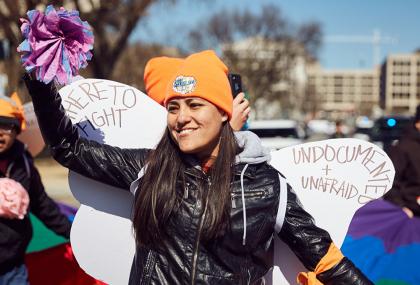
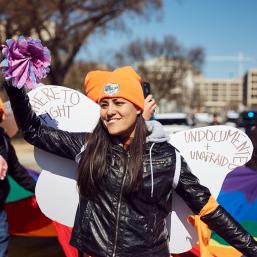
Make the Road New Jersey (MRNJ) won a significant victory this April when the New Jersey state legislature approved legislation that will give equal access to financial aid to undocumented and DACA-mented students. Thousands of young people who call New Jersey home will have a fair chance at going to college and pursuing their dreams.
At a moment when the Trump administration has launched unprecedented attacks on immigrant youth, young people in New Jersey are standing up and fighting back for their dignity and their future. MRNJ youth leaders have waged months of unprecedented action since the end of DACA in September, including a Thanksgiving-week hunger strike, civil disobedience, mobilizing 1,000 people to a statewide day of action on March 5 and dozens of rallies and sit-ins. This federal fight back has helped spark the effort to make New Jersey the ninth state to extend access to state financial aid to immigrant students – and the first in the Trump era. MRNJ also gives credit to and is grateful for its core coalition partners, including Wind of the Spirit, the ACLU of New Jersey, New Jersey Policy Perspective, the Latino Action Network and many more who have fought tirelessly to open the doors to education for Dreamers.
Of the financial aid bill, MRNJ youth leader Erika Martinez wrote, in a recent OpEd in the Bergen Record: “This legislation has given the Dreamers of New Jersey hope that if the federal government won’t give us an equal opportunity to persevere with our peers, our own lawmakers in this state will stand up and fight with us… We know we will get through these dark years and fight our hardest. In the meantime, I want to go to college and finish my education. When I graduate, I hope to live in a country that will finally welcome me.”
The bill now goes to Governor Murphy's desk to be signed into law, and Make the Road youth leaders are planning a comprehensive community outreach campaign to get the word out to Dreamers before the financial aid deadline closes in September. Please chip in to support MRNJ Youth Power organizing committee and to launch an outreach campaign to immigrant students by making a donation here.
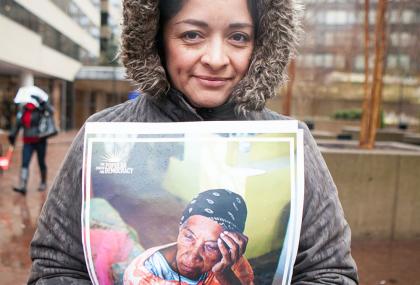

On the 7 month anniversary of Hurricane Maria, Puerto Rican communities held rallies across the country and pressured elected officials to support the housing needs of displaced or homeless families, many of whom are facing eviction or the expiration of their FEMA hotel vouchers, leaving families and students with nowhere to go.
On April 19 and 20, community-based organizations including Make the Roads from New Jersey, Connecticut, New York, and Pennsylvania, New York Communities for Change and Organize Florida hosted press conferences, rallies, and lawmaker office visits to push FEMA to extend aid to displaced families and press local governments to provide resettlement support including housing.
Thousands of Puerto Rican families came to the United States seeking shelter after Hurricane María destroyed tens of thousands of homes on the island, and many others are still fleeing as the humanitarian crisis worsens. Many of those families now on the mainland are still struggling to find a home and are still waiting for the island to recover. Many have nowhere to go and FEMA hotel vouchers are about to expire for hundreds of families. FEMA has failed these families by threatening to cut funding for housing and providing little to no support for these families to relocate.
At the same time, states like Connecticut and New Jersey have introduced legislation to support families, including funding for housing and legislation condemning the foreclosure of homes on the island. Groups will advocate for these and other states to expand and introduce measures to assist Puerto Rican families fleeing the humanitarian crisis.
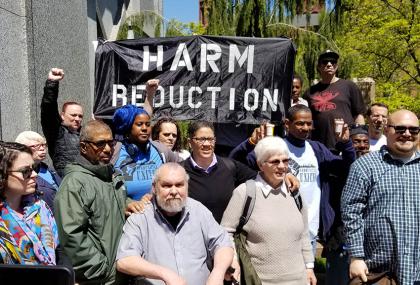
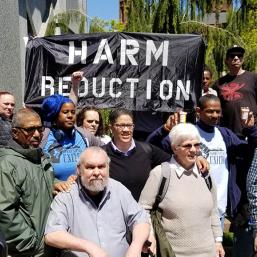
In recent years, billionaire pharmaceutical executives and hedge fund managers have made billions in profit by creating, feeding, and treating a crisis of opioid addiction in the United States.As the opioid crisis has turned into a full-blown national public health epidemic, CPD’s Opioid Network, in partnership with Hedge Clippers and P.A.I.N., traveled to Washington, DC on April 26 to take action and address the current overdose crisis.
The action convened in the Arthur M. Sackler Gallery at the Smithsonian Institute with famed photographer Nan Goldin and dozens of drug user activists from CPD affiliates including: Arkansas Community Organization, Delaware Alliance for Community Advancement, Action NC, Hoosier Action, Maryland Communities United, and Rights and Democracy VT & NH. After the action, the group held a press conference and lobby day on Capitol Hill to lift up newly introduced legislation from Senator Elizabeth Warren and Representative Elijah Cummings called the CARE Act that the CPD Opioid Network helped to create and advance.
CPD’s Opioid Network formally launched in November of 2017 and has organized our affiliates, harm reduction activists, labor organizers, academics and allies who are interested in ending the current overdose crisis. This network includes people who use drugs, people who suffer with pain, family members who have lost a loved one to overdose, medical providers, activists, and allies. The Opioid Network insists that this epidemic is a political crisis that is a direct result of our inadequate healthcare system. This crisis is further exacerbated by the longstanding policies that view substance use disorder as an issue easily addressed with law enforcement solutions. We stand firm that the provision of more and better healthcare is the only effective solution to opioid crisis.
Since its launch, the Opioid Network has continued to meet weekly and in in-person strategy sessions. The network chose to focus its advocacy on the following goals:
- As the cornerstone of substance use treatment, prevention and services, Medicaid funding must be preserved, expanded and increased.
- As the public health crisis of our time, the Opioid Epidemic requires a comprehensive public health approach that empowers the people directly impacted to make the decisions about where funding goes. Increased funding for or policies that strengthen law enforcement increase the rates of overdose and are not helpful. An important example for such comprehensive legislation that creates "planning councils" where the people directly impacted are deciding how to use the funding is the Ryan White CARE Act.
- Producers of opiates, such as Purdue Pharmaceuticals, should contribute towards the cost of this public health crisis. Congress should include a "windfall tax" on profits made by producers to help fund comprehensive legislation.
- The Opioid Network provides a place for organizations and activists to strategize and support each other to pass state and perhaps even regional campaigns for effective public health solutions such as widespread access to Naloxone, clean syringes, Medicated Assisted Treatment and safe consumption sites. These solutions should be expanded in every state.



